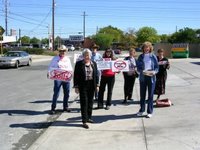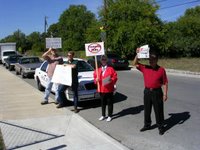Tunnel path altered ‘without approval’
Ean Higgins
The Autralian
08nov05
THE private consortium building Sydney’s controversy-plagued Lane Cove Tunnel secretly changed its route without seeking approval or informing the local council.
Had the company stuck to the plan approved by the council, a block of apartments seriously damaged by a tunnel cave-in last week would have been spared.
The 65m change in the route around the site of the tunnel collapse has prompted speculation as to whether the builders had conducted adequate geological surveys or, as some independent engineers have suggested, they rushed the project.
The extraordinary revelations contained in a Lane Cove Council report released last night will fuel outrage over the state Government’s handling of privately funded infrastructure projects.
“It is yet another example of how government oversight of such projects is grossly inadequate,” Opposition Leader Peter Debnam said.
It will also play into the hands of an expanding group of dissidents in the Labor Party, whose caucus meets this morning.
The Left, emboldened by intervention from the right-wing Labor machine, will press for the Government to scrap “public-private partnerships” such as toll roads and the controversial $2billion desalination plant planned for Sydney.
The Left will press for the Government to borrow for infrastructure rather than cede control to the private sector and grant concessions.
It may even suggest a state version of infrastructure bonds, a concept which under a federal plan provided extraordinary tax concessions to rich investors.
The Left, which will also take on Premier Morris Iemma over terror laws, could use the latest scandal over the $1.1billion Lane Cove Tunnel as a prime example of the way public-private partnerships can lead to a loss of transparency.
The council report indicates that the successful consortium, the Lane Cove Tunnel Company, which involves Chinese and other investors, quietly made substantial changes after it won planning approval.
In the scathing report prepared for last night’s meeting, council officers say they discovered a number of previously secret “major modifications to the project”, made after approval was given in December 2002.
The changes had not been acknowledged by the company or the Government, the report says.
It lists changes including the fact that the “exit to eastbound tunnel and entrance to westbound tunnel (was) relocated further to east by 145m”.
The report also says that “of particular relevance to events this week”, the project deed drawings dated November 18, 2003, and plans on display at the Project Display Centre just last week, show the location of the collapsed exhaust tunnel 65m further east of the damaged block.
“Whilst not discussing causation, an investigation needs to consider what information was provided to the unit owners in regard to the relocation,” the report says.
It lists a number of other changes that appear to have been secretly negotiated with the Roads and Traffic Authority.
“The changes were agreed to without any consultation with other government agencies,” the report says. “None of these changes were formally assessed by the RTA until 28 April, 2004, nearly five months after the contract was signed.”
A spokesman for the tunnel consortium, Trent Mumford, said the changes were made according to state government guidelines.
© The Australian




